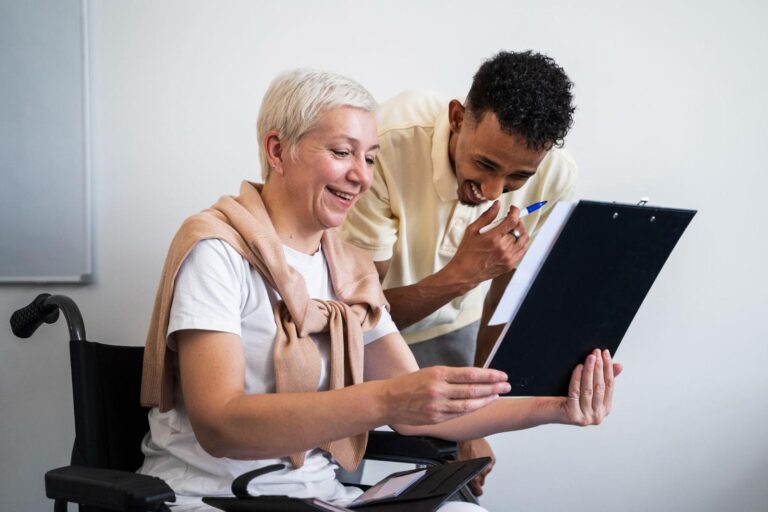Caregiving is more than a list of responsibilities. It’s a relationship between the person providing care and the one receiving it. Whether you’re supporting a loved one at home or working in a professional care setting, the emotional demands of caregiving can be just as significant as the physical ones.
Typical training often focuses on technical skills, such as giving medication, maintaining hygiene, and assisting with mobility. However, caregivers are rarely prepared for the emotional weight that comes with caregiving. This is where mindful caregiving really makes a difference.
At Zen Caregiving Project, we have seen firsthand how mindfulness can improve caregiving. Stress is reduced, communication is clear and effective, and caregivers are able to handle their emotions better, no matter how challenging the situation. We strongly believe that mindful caregiving should be an essential part of every caregiver training.
What Is Mindful Caregiving?
Mindful caregiving means focusing your attention fully on the present moment, with compassion and emotional balance. It’s about cultivating moment-to-moment awareness that supports both the caregiver’s presence and the quality of care they offer.
Some simple but effective techniques of mindfulness, such as breath awareness, grounding exercises, and reflective pauses, teach caregivers how to respond rather than react. This helps them gain emotional flexibility, allowing them to handle the tough moments of caregiving with a calm and focused mind.
Mindful caregiving means respecting the humanity of both the caregiver and the care recipient. It means valuing connection more than control, adopting compassion instead of judgment, and practicing moment-to-moment self-care.
Why Traditional Training Often Falls Short
Caregiver training programs often focus on practical skills, such as safe body mechanics, administering medication, and documenting symptoms. But when it comes to emotional regulation, self-care, or grief support, these programs often overlook the deeper human challenges caregivers face. As a result, many caregivers are left without the tools they need to sustain their well-being while providing effective support.
This leaves caregivers unprepared for challenging situations, such as:
- Emotional overwhelm
- Burnout and compassion fatigue
- Difficult conversations with family or patients
- Navigating grief, loss, or fear
- Maintaining personal boundaries
Without tools to manage emotional stress, caregivers, no matter how skilled, face exhaustion, disconnection, and emotional issues. Integrating mindful caregiving into training can fill this gap and give caregivers the tools they need to manage their emotional well-being.
Benefits of Including Mindfulness in Caregiver Training
Here are some of the proven ways that mindfulness enhances caregiver well-being and effectiveness:
1. Reduces Stress and Burnout
Mindfulness has been shown to lower cortisol levels, reduce anxiety, and improve emotional regulation. According to the Mayo Clinic, regular meditation and mindfulness practices reduce stress, increase self-awareness, and improve emotional well-being. Caregivers who practice mindfulness are better equipped to handle stress without becoming overwhelmed.
2. Improves Focus and Presence
The most important thing in caregiving is being fully present. Whether you’re helping someone get dressed, cooking a meal, or offering emotional support, your attention matters. Mindfulness trains the brain to focus and return to the present moment, improving both your connection and attentiveness.
3. Supports Emotional Resilience
Caregivers experience intense emotions on a regular basis, like grief, guilt, frustration, and helplessness. Mindfulness doesn’t eliminate these emotions, but it teaches how to face them with kindness and clarity. Gradually, mindfulness builds strength from within and increases the capacity to stay grounded in tough situations.
4. Enhances Compassion While Avoiding Empathic Distress
Many caregivers find that their empathy becomes exhausted when taking on too many responsibilities. Mindful caregiving teaches how to distinguish between compassion and emotional enmeshment. It teaches how to maintain kindness to others but also recognize your own limits in order to avoid compassion fatigue.
5. Encourages Healthy Emotional Boundaries
We get so involved in caregiving that we often forget to make time for ourselves or advocate for our own needs. Mindfulness teaches that it is important to be aware of your emotional and physical experience. This helps caregivers establish healthy boundaries so they can care for themselves while also giving their best to others.
What Mindful Caregiving Looks Like in Practice
Integrating mindful caregiving into training doesn’t require an overhaul; it can begin with small but impactful shifts in how we approach the caregiver role. Here’s how mindfulness can be woven into training:
- Start sessions with breath awareness practice or a short grounding activity
- Include time for personal reflection after emotionally charged case studies
- Teach practical tools like mindful listening, body scanning, or journaling
- Explore topics such as grief, acceptance, and self-compassion
- Provide guided meditations caregivers can return to in daily life
By normalizing emotional reflection and mindful awareness, caregiver training can become more person-centered and impactful.
The Zen Caregiving Project Approach
At Zen Caregiving Project, we’ve spent over 35 years integrating mindfulness and emotional support into the caregiving experience. Our Mindful Caregiving Education (MCE) program is built around this very idea that caregivers deserve tools not only to care for others but to care for themselves.
Our courses are not designed to replace clinical certification but to complement it, offering a human-centered dimension that many training programs leave out.
What you’ll learn through our mindful caregiving programs:
- Somatic techniques to reduce stress in the moment
- Tools for navigating loss, grief and uncertainty with clarity
- Practices for cultivating presence and deep listening
- Strategies to maintain sustainable compassion for self and others
- Group dialogue and shared reflection to build connection and resilience
Whether you’re a family caregiver, a professional in healthcare, or someone exploring caregiving as a calling, our programs are here to support your growth and well-being.
Mindfulness Backed by Research
The benefits of mindful caregiving are not just anecdotal; they’re backed by science. A recent study, published in the journal Mindfulness, evaluated the impact of our online mindfulness training for family caregivers. The results were clear:
- Participants reported decreased anxiety and depression
- They experienced less caregiver burden
- Their overall sense of well-being improved significantly
These findings affirm what we’ve observed for decades: when caregivers are supported emotionally, they care better and they care longer.
Who Can Benefit from Mindful Caregiving Training?
Mindful caregiving is valuable for:
- Family caregivers providing care at home
- Professional caregivers in hospitals, hospice, or long-term care
- Volunteers supporting aging or ill community members
- Healthcare workers seeking deeper emotional balance
- Anyone preparing for future caregiving roles
If you’re providing any level of support to someone else, mindfulness can help you navigate that role with more peace, strength, and clarity.
How to Get Started
At Zen Caregiving Project, we offer self-paced and live interactive courses online throughout the year. Each program is led by experienced facilitators and includes a blend of guided practices, group discussion, and practical tools.
You don’t need any prior experience with meditation or mindfulness. Our courses are accessible, inclusive, and designed to meet you where you are.
To view current offerings, visit ZenCaregiving.org.
It’s Time to Rethink Caregiver Training
Caregiving is an act of love, and like all relationships, it requires presence, patience, and emotional strength. It’s time for caregiver training to reflect this reality.
When caregiver training includes mindful caregiving, it not only improves the quality of care but also helps caregivers feel supported, seen, and empowered. Mindfulness isn’t just a wellness trend; it’s a foundation for human connection and sustainable service.If you’re ready to explore mindful caregiving, we invite you to join us. Discover how mindfulness can reshape your caregiving experience at ZenCaregiving.org.


